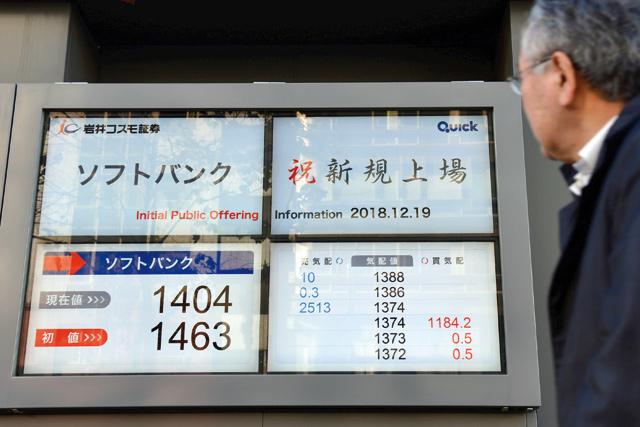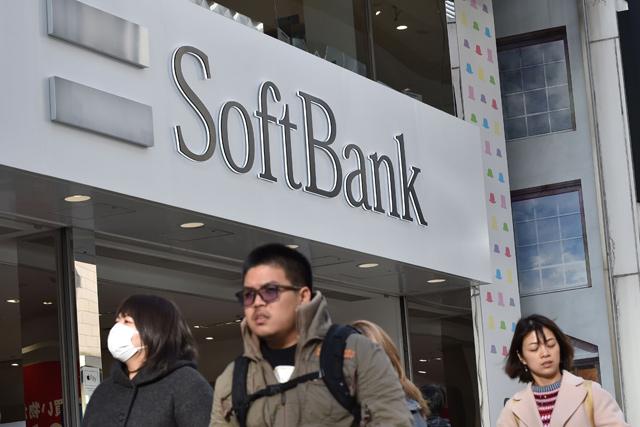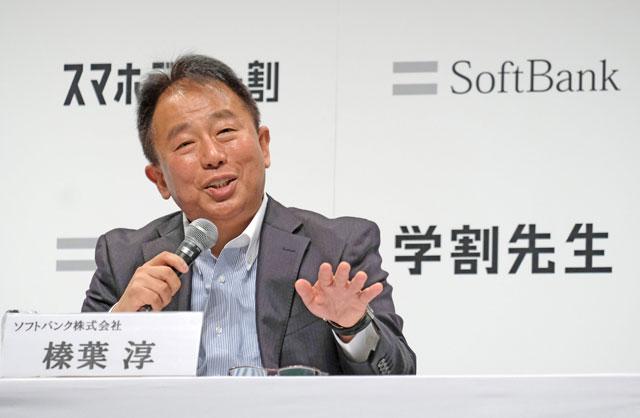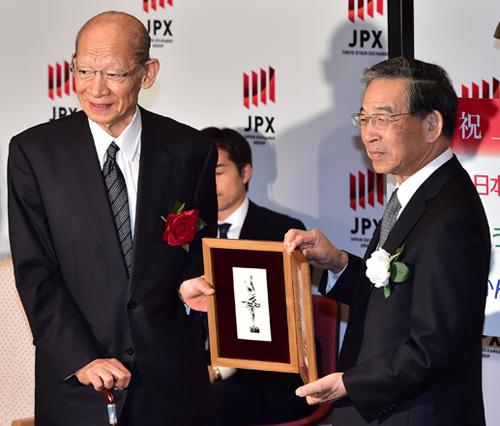You are here
SoftBank telco suffers $9b slump on debut after record IPO
By Reuters - Dec 19,2018 - Last updated at Dec 19,2018

A pedestrian looks at a stock indicator board showing the opening price of the Japanese mobile unit of the SoftBank Group (bottom left) on the Tokyo Stock Exchange in Tokyo on Wednesday (AFP photo)
TOKYO — SoftBank Corp. shares sank 15 per cent on debut, wiping $9 billion off their value, as investors sold off the telecoms operator after its record IPO on worries about a recent service outage and its exposure to Chinese telecoms gear maker Huawei.
The poor start for the unit of tech investment giant SoftBank Group Corp.. meant that for Japan’s mom-and-pop investors concerns about the company and the nation’s telecoms market trumped the appeal of the group’s charismatic founder Masayoshi Son.
Such a debut is uncommon in the Japanese IPO market. Of 82 IPOs so far this year, SoftBank Corp.’s $23.5 billion float was only the seventh to open below the offering price. Among recent major IPOs, Japan Display was the only one to flop, suffering a fall in its 2014 debut.
“There was a disruption in its network early this month as well as Huawei’s issues. There hasn’t been good news involving SoftBank recently,” said Tetsuro Ii, chief executive officer at Commons Asset Management.
Shares of SoftBank Corp. closed at 1,282 yen, 14.5 per cent lower than its IPO price of 1,500 yen and giving the telco a market cap of about 6.1 trillion yen — about 1.1 trillion yen below its value at the time of the IPO. Shares opened trading at 1,463 yen. “It was beyond our expectations that the shares would fall that much,” said a senior executive at one of SoftBank Corp.’s domestic lead underwriters, declining to be named since he was not authorised to discuss the matter with the media.
SoftBank Corp. shares were the most heavily traded on the Tokyo Stock Exchange’s first section, as amid heightened risk aversion the benchmark Nikkei 225 index fell to a nine-month low, closing down 0.6 per cent. SoftBank Group lost 0.9 per cent.
The IPO was Japan’s biggest ever and just shy of the world record $25 billion 2014 listing of Chinese e-commerce giant Alibaba Group Holding, a SoftBank Group portfolio company.
SoftBank Group raised 2.65 trillion yen in the IPO. It will retain about 63 per cent of the newly listed unit should a greenshoe option be exercised in full. The IPO is a milestone in the conglomerate’s transformation into primarily a global tech investor.
During the IPO period, Japan’s third-largest mobile phone network provider by subscriber numbers suffered a rare nationwide service outage, which it said would not affect earnings or dividends.
Adding to investor worries, SoftBank Corp.’s relationship with Huawei Technologies Co. Ltd. came under scrutiny as governments around the world moved to shut out the Chinese firm amid worries its equipment could facilitate Chinese spying. Huawei has repeatedly insisted Beijing has no influence over it.
The Japanese company on Thursday downplayed the impact a shut-out of Huawei equipment would have, with SoftBank Corp. CTO Junichi Miyakawa saying the gap between the Chinese maker’s 5G gear and its competitors’ has closed and that the potential cost of replacing existing Huawei hardware would only be hundreds of millions of yen.
SoftBank wants further clarity on the Japanese government’s stance before making a decision on Huawei gear, the company said. It plans to replace the network equipment, two sources said last week.
Even before SoftBank kicked off the IPO process in November, there had been uncertainty over the growth prospects of the Japanese wireless industry after the government said there was scope for the carriers to cut fees by as much as 40 per cent.
In response Son has said SoftBank will increase automation and reduce headcount at its mobile operations by 40 per cent over the next two to three years, focusing instead on new growth areas. It has already shifted 2,500 staff to ventures outside the core telecoms business like payments app PayPay.
Other headwinds include Japan’s ageing population and Rakuten’s entry to the wireless market, said Chris Lane, senior analyst at Sanford C. Bernstein. “All of these things point to earnings pressure on the telco side for all operators, not just SoftBank,” he said.
SoftBank Corp. is forecasting 3.3 per cent revenue growth and 9.7 per cent operating profit growth in the financial year ending in March compared to a year earlier, with profits underpinned by demand for high-speed internet services.
IPOs are popular among Japanese retail investors, many of whom see them as sure profit bets given their tendency to open much higher than offering prices.
In SoftBank Corp.’s case, an added attraction was its promise of a dividend payout of 85 per cent, much higher than those of rivals NTT Docomo and KDDI Corp..
“A dividend yield around 5 per cent is attractive, but the mobile communication industry is expected to face headwinds from next fiscal year,” Ii of Commons Asset Management said.
The IPO attracted about twice as many retail orders as the number of shares offered, sources at lead underwriters said last week. A smaller portion of shares offered to overseas institutional investors was three times oversubscribed.
It remains to be seen whether SoftBank’s weak market debut will have a negative impact on Japan’s IPO market, where most of companies are small startups and demand can easily overwhelm the small number of shares offered.
Kudan Inc., a startup developing “artificial perception” technology, made its debut on Wednesday on the Tokyo Stock Exchange’s Mothers market. Its shares were untraded due to a glut of buy orders.
Related Articles
TOKYO — Telecoms giant SoftBank will list shares in its Japanese mobile unit next month in a sale that could raise over $21 billion and be o
TOKYO — Shares in Japan's SoftBank Group soared six per cent on Monday on reports it could list its mobile unit, raising up to $18 billion i
TOKYO — Japan Post skyrocketed on its trading debut Wednesday after the biggest initial public offering (IPO) this year, lifting hopes that














